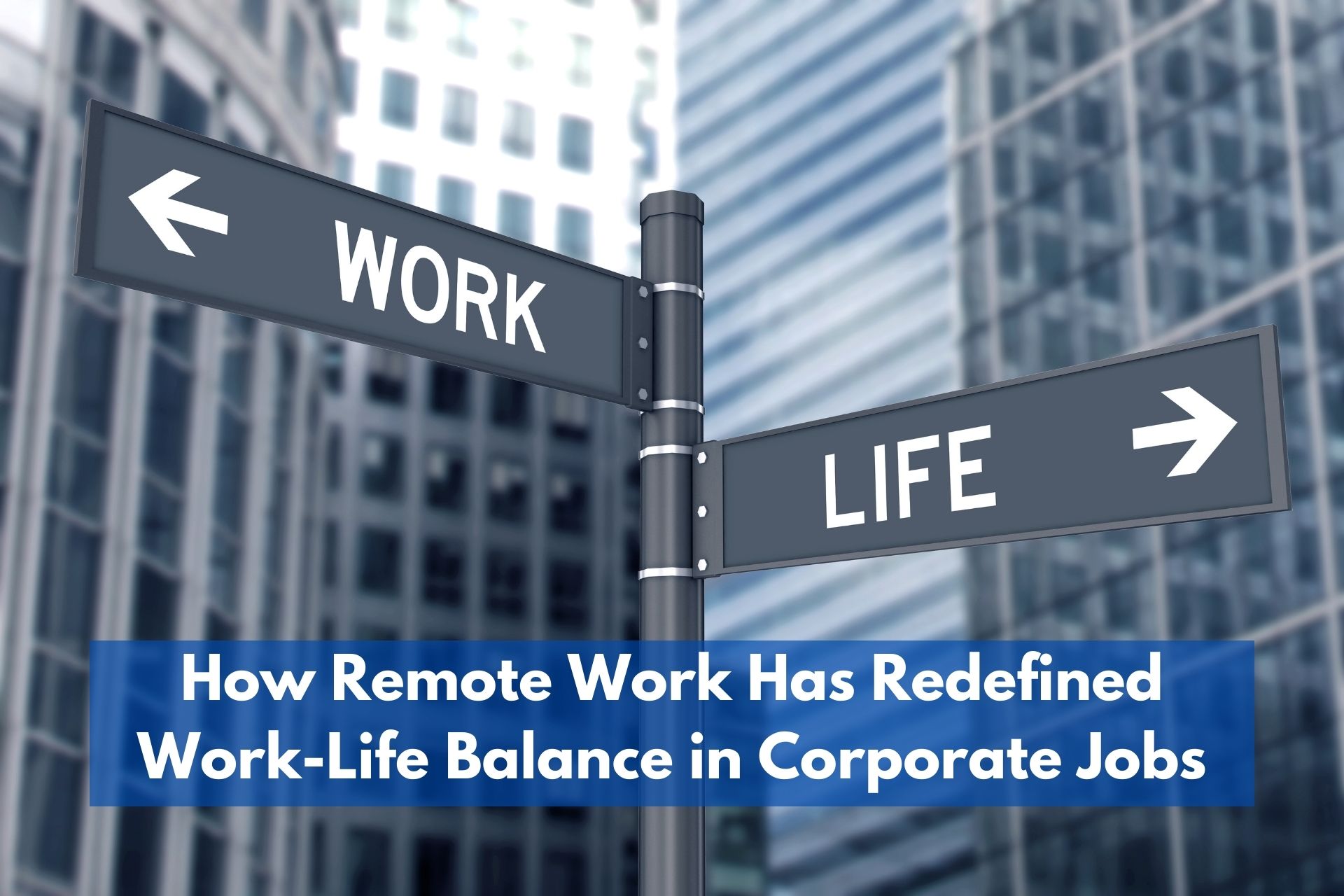How Remote Work Has Redefined Work-Life Balance in Corporate Jobs

The rise of remote work has drastically changed the way corporate employees approach their daily routines. Before the COVID-19 pandemic, most employees worked from offices with set hours, long commutes, and limited flexibility. But as companies around the world transitioned to remote work, this shift has redefined the concept of work-life balance in corporate jobs.
In this article, we will explore how remote work has reshaped work-life balance, its benefits, challenges, and how companies and employees can make the most of this new working model.
Flexibility to Manage Personal and Professional Lives
One of the most significant impacts of remote work on work-life balance is the increased flexibility it offers. Without the need to commute or adhere to strict office hours, employees have more control over how they organize their day. This flexibility allows them to balance personal responsibilities—such as childcare, household chores, or exercise—while managing their professional duties.
For instance, a remote worker might start their day earlier or later, depending on personal obligations, allowing them to better manage their time. This flexibility helps employees feel less pressured, reduces stress, and improves overall well-being.
Improved Time Management
With remote work, employees save valuable time that would otherwise be spent commuting to and from the office. This extra time can be invested in productive activities, such as starting the day with a healthy breakfast, exercising, or spending quality time with family.
Remote work allows employees to create their own schedules, helping them find a balance between work and personal time. For example, some employees might choose to take short breaks during the day, allowing them to recharge and be more productive when they return to work.
According to a survey, 71% of remote workers reported better work-life balance, while those without remote options were nearly twice as likely to suffer from poor mental health(
Additionally, 63% of professionals said they’d prefer remote work even over higher pay, demonstrating its role in reshaping employee priorities.
Blurring of Boundaries Between Work and Personal Life
While remote work offers flexibility, it can also blur the boundaries between work and personal life. With the office now at home, some employees find it challenging to “switch off” from work at the end of the day. This can lead to longer working hours, which can negatively impact work-life balance.
Without clear boundaries, remote workers may feel the pressure to be available all the time, leading to burnout and exhaustion. To maintain a healthy work-life balance, it’s essential for employees to set clear work hours and communicate those boundaries with their colleagues and managers.
Increased Autonomy and Responsibility
Remote work has given employees more autonomy over how they complete their tasks. Without constant supervision or the structure of an office environment, employees must take responsibility for their own productivity and time management. This sense of autonomy can be empowering, as it allows individuals to work in a way that suits them best.
However, with greater autonomy comes great responsibility. Employees need to develop strong self-discipline and time management skills to ensure they remain productive while maintaining a balance between their work and personal lives.
Mental and Physical Health Benefits
Remote work has provided many corporate employees with the opportunity to prioritize their mental and physical health. Without the stress of long commutes and rigid schedules, employees can take better care of themselves. For example, remote workers can take breaks for physical activity, prepare healthier meals at home, and create a more comfortable work environment.
Additionally, the flexibility to work from home has been beneficial for employees’ mental health. They can take time for self-care, spend more time with loved ones, and avoid the stress that often comes with office politics and commuting.
Challenges in Communication and Collaboration
While remote work has its advantages, it also presents challenges, particularly in terms of communication and collaboration. In an office setting, employees can easily walk over to a colleague’s desk to discuss a project or attend in-person meetings. Remote work, however, requires reliance on virtual communication tools such as video calls, messaging platforms, and emails.
These virtual interactions can sometimes lead to misunderstandings or a lack of personal connection, which can impact teamwork and productivity. To overcome these challenges, companies must invest in effective communication tools and encourage regular check-ins to ensure employees feel supported and engaged.
Importance of Company Support
As remote work continues to redefine work-life balance, companies must play an active role in supporting their employees. Offering flexible working hours, encouraging employees to take breaks, and promoting a healthy work-life balance are essential.
Additionally, companies can provide resources for mental health support, virtual team-building activities, and regular feedback sessions to ensure employees feel connected and valued. This not only helps maintain a positive work-life balance but also boosts employee morale and job satisfaction.
Work-Life Integration as a New Norm
Remote work has shifted the focus from work-life balance to work-life integration. Rather than separating work and personal life into distinct categories, employees are finding ways to integrate the two seamlessly. For example, someone might take a break during the workday to run an errand or attend a family event, then return to work afterward.
This integration allows employees to fulfill both personal and professional obligations without feeling overwhelmed. However, it requires discipline and clear boundaries to ensure that work does not encroach too much on personal time.
Future of Work-Life Balance in Corporate Jobs
As remote work becomes more common, it’s clear that the traditional concept of work-life balance is evolving. The flexibility and autonomy that come with remote work have redefined how employees manage their time and prioritize their well-being.
In the future, companies that continue to offer remote work or hybrid work models will need to prioritize employee well-being and create a culture that supports flexibility. By doing so, they can attract and retain top talent while ensuring that employees maintain a healthy work-life balance.
Redefining Work-Life Balance in the Era of Remote Work
Remote work has significantly redefined the concept of work-life balance in corporate jobs. While it offers flexibility, autonomy, and the ability to prioritize personal well-being, it also comes with challenges such as blurred boundaries and communication difficulties.
By setting clear work hours, maintaining open communication, and taking advantage of the flexibility remote work offers, employees can achieve a healthier work-life balance. At the same time, companies must actively support this shift by providing the necessary tools and promoting a positive work-life culture.
In this new era of work, achieving work-life balance is no longer about keeping work and personal life separate but finding harmony between the two.




